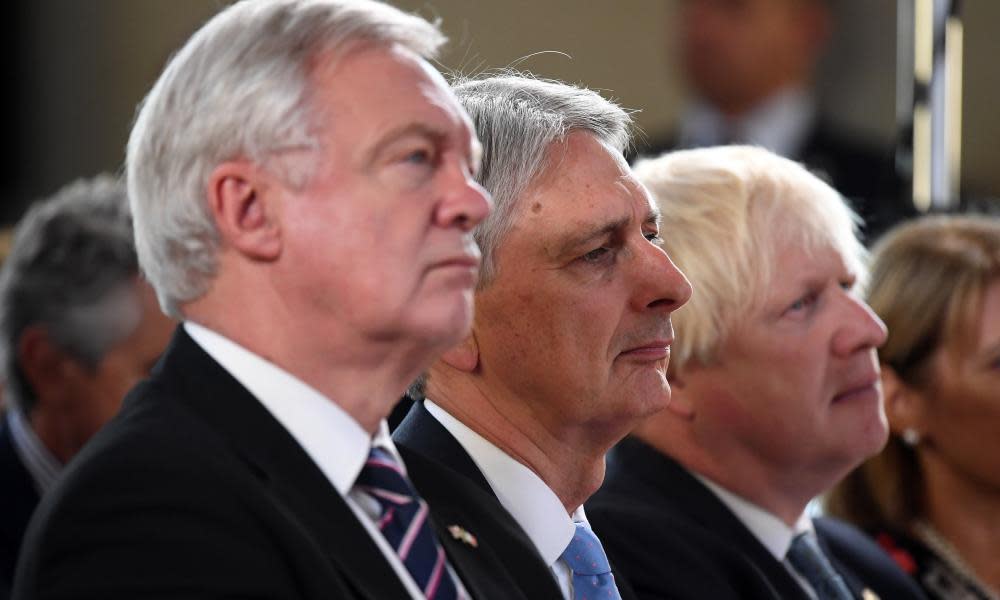Davis dismissive of Johnson's influence on May's Florence speech

Boris Johnson’s personal blueprint for leaving the EU had no influence on the prime minister’s flagship speech in Florence, David Davis, the Brexit secretary, has said.
Davis dismissed the idea that Johnson had changed the government’s thinking on Brexit after allies of the foreign secretary briefed several newspapers that his 4,000-word Telegraph article stopped the prime minister veering towards a softer Brexit.
They said Johnson had managed to keep transition to two years and successfully stopped May backing the so-called “Norway option”, under which Britain would continue to have access to the EU’s single market in return for payment and adherence to its rules and regulations.
But Davis downplayed his colleague’s significance, telling the BBC’s Andrew Marr Show: “I have to say that the policy in the prime minister’s speech has been coming for a long time. Some of it we were designing months ago. I don’t think there has been any change in policy in the last few weeks.”
Johnson’s article was published a week before May’s Florence speech, in which the foreign secretary called for the government to honour Vote Leave’s pledge to bring back £350m a week to spend more on the NHS.
In a further dig at Johnson, Davis praised an interview given by Amber Rudd, the home secretary , in which she accused the foreign secretary of “backseat driving”.
Asked whether he agreed with her assessment, he said: “My car has only got two seats ... It was a very good interview, I thought.”
The briefings about Johnson having influenced May’s Florence speech are the latest evidence of the tensions and power struggles in cabinet.
Davis is set to embark on a fresh round of talks on Britain’s EU withdrawal when he meets the EU’s chief negotiator, Michel Barnier, in Brussels on Monday.
While Barnier has welcomed the “constructive spirit” of May’s speech, it is unclear whether it will be enough to unlock the talks and enable them to move on to the next stage covering Britain’s future relations with the EU, including a free trade deal.
The scale of plots to replace May over the summer was also revealed this weekend in a new book about the aftermath of the EU referendum called Fall Out: A Year of Political Turmoil.
The account by Tim Shipman, political editor of the Sunday Times, gives details of how the prime minister came closer to being toppled than has been publicly acknowledged.
It gave details of how senior cabinet ministers after the election considered ousting May in June, including an offer by the chancellor, Philip Hammond, to back Johnson for the leadership.
It revealed that Hammond texted Johnson in the early hours as the election results were still coming through to say he would back him for the leadership if he continued to run the economy, while Davis would also keep his brief. However, the plan came unstuck when Davis would not back the idea of being junior to Johnson.
A source confirmed to the Guardian that several cabinet ministers had texted Johnson giving him their backing for a potential run against the prime minister in the immediate hours after the election, when the results were still not clear.
Since then, Hammond and Johnson have been on opposite sides of the Brexit argument. The chancellor has been pushing for a transition period of longer than two years that maintains the status quo, while the foreign secretary has been battling to reduce the length of the transition and is unhappy with signing up to new EU regulations after March 2019.
Some senior Conservatives believe Johnson is trying to goad May into sacking him for insubordination so that he is well positioned among Brexiters to replace her as leader when the time comes for another contest.
Shipman’s book detailed two other plots to oust the prime minister. The second was an attempt by supporters of Davis, which was widely reported before parliament’s summer break.
One source was reported as saying Davis was well aware of the attempt by one of his supporters to collect names of Tory MPs willing to challenge the prime minister, which reached between 30 and 50.
The book says the third attempt was a growing campaign to prepare Rudd for a leadership bid if the role became vacant.
It said senior Conservatives such as David Cameron and Sir John Major rallied around Rudd as a candidate from the moderate wing of the party after Ruth Davidson, the Scottish Conservative leader, ruled out standing in a snap byelection.
The machinations over the Tory leadership leave May in a vulnerable position going into the Conservative party conference, where she will have to get through a speech to the grassroots membership.
Senior figures with ambitions for the leadership are also likely to use the conference platform to set out their pitches for the future of the party and Brexit.
The party conference in Manchester in just over a week’s time will also be grappling with the issues of how to appeal to younger people with better policies on student fees and housing. The Labour leader, Jeremy Corbyn, won young voters over in large numbers during the election.

 Yahoo News
Yahoo News 
